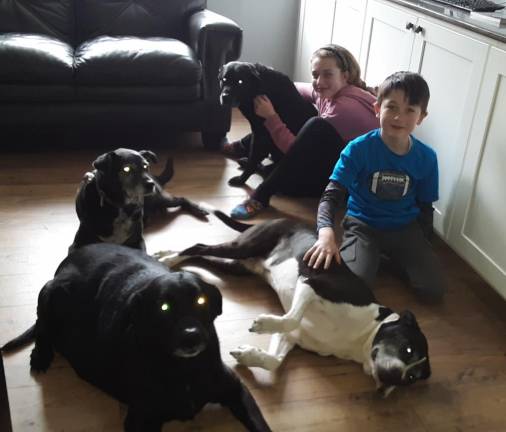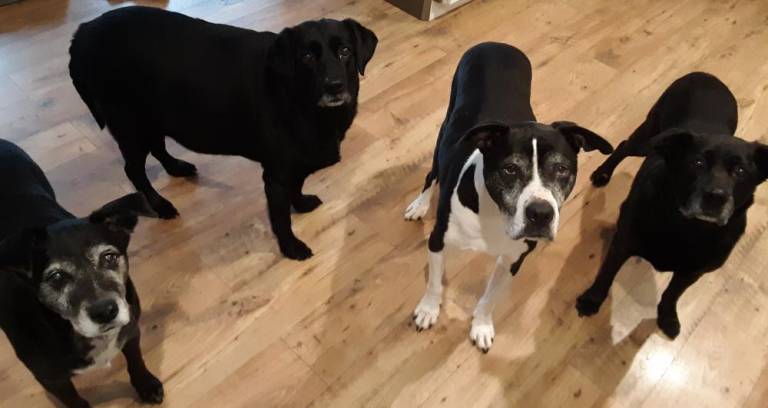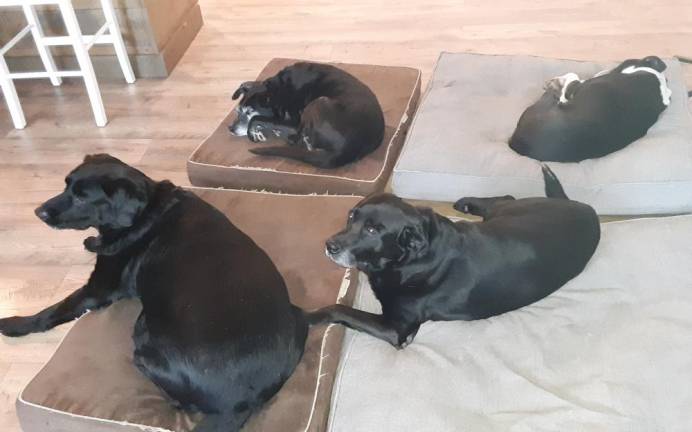Quarantine dogs
Pet adoptions and fostering are up, helping shelters prepare for a pandemic-related influx



The Harrison-O’Keefe family had two big dogs and wasn’t looking for more. But when Christopher Harrison and Tiffany O’Keefe drove past a sign advertising a pair of senior black labs in need of a home, he looked at her out of the corner of his eye: Had she seen it, too?
They had a family policy about adopting only older dogs. They had a big yard in Warwick encircled by an electric fence. And with schools closed, their two kids and O’Keefe, a counselor at a school in Rockland, were home all day.
When Harrison got home later, and O’Keefe’s car wasn’t in the driveway, “I knew right away exactly where she was,” he said. She’d stopped at the house to ask about the dogs.
They brought their two dogs, an 11-year-old Great Dane-pitbull mix and a 12-year-old mutt, over to socialize in the backyard with the labs, 13 and 8. Both labs – taken in from Newburgh months earlier when their owner had had to move – looked healthy and in good shape for their age. The woman who had rescued them was on the verge of splitting them up, to get them adopted.
In the past, they’ve tended to adopt dogs when the timing wasn’t right, Harrison laughed, and it had worked out every time. This time, all the pieces were actually in place, including that x-factor for many right now, job stability: O’Keefe has tenure, and Harrison is a civil engineer working on a years-long New York City public works project. “It just seemed like it was something worth doing for us,” he said. The quarantine “was really the push we needed."
A week and a half later, the blended family has settled right in. The canine foursome enjoys lounging side by side, each on its own cushion, taking turns soaking up back scratches and belly rubs from the kids. “It’s fun to take them out in the yard, throw stuff around with them,” said Harrison. “They just do goofy dog stuff in the house, too.”
Aren’t four big dogs a lot? “There’s four of us,” he pointed out. “Also they’re older dogs, their needs aren’t as much.”
A silver lining
Increased adoptions and fostering have been a silver lining of the coronavirus pandemic, said Cassie Kowalchuk, volunteer president at One Step Closer Animal Rescue (OSCAR) in Sparta, N.J. There’s always a surge in adoptions when the weather gets nice, but never like this year. “People who were thinking about adopting are taking advantage of working from home right now,” said Kowalchuk, who volunteers 20-30 hours at the shelter on top of her full-time job as an accountant. “It’s a great time to be home with the animal and train.”
Typically, the shelter might have five or six pets in foster homes, she said. “Now people are definitely stepping up a lot more. I want to say we have close to 20 animals in foster homes right now.”
But there is a flip side to the pandemic, as pet owners, suddenly jobless, sick or worse, are having to say goodbye to their pets. “People are surrendering,” said Kowalchuk. “We are trying to take owner surrenders and help with that,” she said. “We’ve always taken animals from other shelters due to be euthanized first, then owner-surrenders second,” since usually the owners have a few weeks of leeway time-wise.
That leeway is shrinking.
“Last week we took four or five owner-surrenders,” she said. “Somebody literally wrote me, ‘Help Needed,’ is the subject,” she said, reading one of 74 emails to land in her inbox that day. “‘Lost job, at this point we have a two-week supply of food, we are behind on vetting, so anything you are able to assist with is greatly appreciated.’”
On top of individual surrenders, “testing facilities that test on animals are closing, so those animals need to be rescued. A lot of shelters are choosing to close, so the ones that are remaining open, there’s that much more pressure on them,” Kowalchuk said.
'A believer in giving options'
Whether or not the shelter can take a pet, they'll do what they can: courtesy-list the animal for adoption online, or point the owners toward pet food banks near them. “Even if we are insanely full and I’m pulling my hair out, I’m still a believer in giving options,” Kowalchuk said. A little support at the right moment might be enough to get them over the hump, she said. “If they lost their job and they’re hurting, it doesn’t make sense for them to take a long drove up to us. If they’re farther away, I try to give them a resource closer.”
At the same time, “we’re in the same boat” as strapped pet owners, Kowalchuk said. “We’re even low on supplies.” They’re having as hard a time as anyone securing bleach, laundry detergent, Lysol spray, plastic gloves, Pine Sol and paper towels. Their twice-monthly supply drives at Walmart and area supermarkets that usually provide most of these basics have been cancelled through mid-May. Now they have to buy those supplies themselves, and more of them than usual to meet upgraded safety protocol, like a new mask for each adoption appointment. Plus, the products themselves are now twice as expensive. A pack of gloves that used to run between $3 and $4 now costs $6 to $7, said Kowalchuk. “You go to the store, they have limits on everything,” she said. “I understand why they do it, but it’s hard to get your hands on the stuff you need.”
They have slashed their volunteer crew from about 20 to four to minimize risk to their six part-time kennel staff. “We’re trying to still help animals but also keep our people safe, keep the public safe.” Funding is drying up as big fundraisers like their annual 5K have been pushed back. Individual donations are slowing, too. “March we typically see a bunch of donations right before Easter – we have not,” she said.
“We put a contingency plan in place to do everything we can to just weather it,” said Kowalchuk. “We just hope, hope, hope by summertime it starts to kind of end. But if it doesn’t, that’s going to really screw us. We have our Tricky Tray in the fall. We really rely on those funds.”
Meanwhile, the shelter is bracing for “kitten season” in April and May. They have 60 to 70 dogs on site, but at the moment only one cat. That will change any day now. “We start getting a lot of calls” at the first sight of litters of outdoor kittens, she said. “That should be interesting, because we’re going to have issues getting spay and neuter.”
Across the country, spay and neuter surgeries have been suspended to protect people and conserve personal protective equipment that’s in short supply. “Pretty much every vet in every state is considering spay and neuter surgeries elective,” said Kowalchuk. “It’s scary now to see what’s happening,” but for the animals this crisis will be playing out downstream for years to come.
Holding capacity
Other shelters, seeing the pandemic coming, started aggressively cleaning house, positioning themselves to be able to absorb some of the fallout.
“Warwick Valley Humane Society is closed due to Covid-19,” says the website of that shelter, which also serves Florida, Chester, Pine Island and Greenwood Lake. That is not exactly true – there are still some animals in the shelter, and staff caring for them in alternating shifts, and adoptions and foster arrangements being made.
They have been following the guidelines handed down by the National Animal Care & Control Association, said Suzyn Barron, Warwick Valley Humane Society president: “Make every effort to keep your numbers low because God forbid people get sick, what do you do next?”
As a result, the staff here has been able to slow its breakneck pace, for a change: “We are usually so crowded with cats and I hate to even say it – let me knock on wood – our numbers are on the low end for us,” Barron said – which is about 55 cats onsite, as well as nine dogs.
“We’ve had upwards of 25 dogs but only 18 kennels,” said Barron. “Right now we’re really able to devote a lot of time to the animals that are here. It’s a nice break for the staff to be able to work with the animals and stem the tide: usually we’re feeding, cleaning, medicating, and the doors open at noon and now you’re dealing with the public."
Holding capacity is a novel focus for animal shelters, which are usually figuring out how to stretch to fit in one more litter. It has meant, first, getting animals out – and for whatever reason, it had been a “phenomenal” few months for adoptions even before the pandemic, said Barron, starting around Christmastime. The increase in fostering, on the other hand, is directly pandemic-related, “because obviously people are home and they think this is the perfect time to get a dog or cat out of a shelter,” she said.
Keeping shelter numbers low also requires strictly limiting intake. That means accepting only emergency calls, said Barron, not the “healthy stray cat that just showed up on someone’s property.”
“We’re asking people to be responsible,” she said. “If you’re feeding a stray cat, continue to feed it, fix it as soon as the clinics are open and running.” Like Kowalchuk, Barron worries about the aftermath of lack of spay and neuter services right now. “I think we might be in for a very tough summer and fall. I understand it kind of not being considered essential, but it’s going to turn into a nightmare, I believe. Maybe I’m wrong. One can only hope," she said. "But now we’re kind of on hold, like everything is on hold."
The Warwick Valley Humane Society has also seen donations dry up. But when they have an urgent, immediate need – garbage bags, canned dog food – they post it on social media and it shows up at their door.
“We’re trying not to over-ask, if there’s such a thing, but to keep us in mind,” said Barron. “There’s a lot of needs going around, whether it’s senior citizens, whether it’s our essential workers in the hospitals. So yes, we take care of the animals, and for all animal lovers, we reach out to them.”
As for pandemic-related surrenders, they had seen nothing as of Tuesday afternoon. “That’s not saying that we won’t, but we haven’t yet,” said Barron. “Which is a good sign. So hopefully people are recovering and able to take care of their pets.”
Adopting out 72 cats and dogs
“Leading up to this whole thing in March, we were kind of preparing for it,” Evan Kerekes, the animal care manager at Father John’s Animal House in Lafayette, N.J., which is in a similar position to the Warwick Valley Humane Society. “We were paying attention to the news. We tried to adopt out as many animals as we could.” They put on a full-court promotional press, eliminating the adoption fee for cats, and ended up adopting out 72 pets, about half cats and half dogs. “People were very interested, kind of gearing up to spend a lot of time at home, so it all worked out."
After a record-setting adoption run, they now have only two dogs, 10 cats and 10 kittens onsite, and a nearly empty kennel at the ready. As for an uptick in surrenders, “We’ve been expecting it, but surprisingly we have not really seen it,” said Kerekes. They’ve taken in one cat whose owner’s family reached out after the owner died of coronavirus. A first responder who had adopted a dog wasn’t able to take care of it “because they’re working crazy hours now, but they found someone else who wanted to take the dog."
Here, too, kitten season is just beginning. “Right now there’s not a lot of spay and neuter going on so there are going to be more cats out there, particularly people who are working on feral colonies," said Kerekes. "That’s very hard to judge, because someone will give us a call, ‘Oh I found these kittens,’ and we take them that day, because they’re so fragile.”
For the first time ever, the shelter has begun offering boarding for the pets of first responders, although no one had taken them up on it as of Monday. “We have all of this room in the kennel, we wanted to use it in the best way we could,” said Kerekes. They have reached out to Atlantic Health, a regional New Jersey hospital network. “We have the space here, we have an awesome facility, and we’re not really using it right now.”
“I’ve been particularly moved by the outreach from the community,” said Kerekes. After the shelter's March beefsteak dinner fund raiser was cancelled, a benefactor stepped up to match all donations for the year, instead of just matching donations from the fundraiser. People have been dropping off pet food and linens, calling up to ask what they can do.
“The other day we had someone who had never adopted from us, never been here, was nowhere in our system, sent us a $400 check with a note that this was their stimulus and they wanted to give it back,” said Kerekes. “Little things like that, a lot of people are out of work, a lot of people are struggling with food insecurity, and people are still prioritizing the animals’ welfare.”